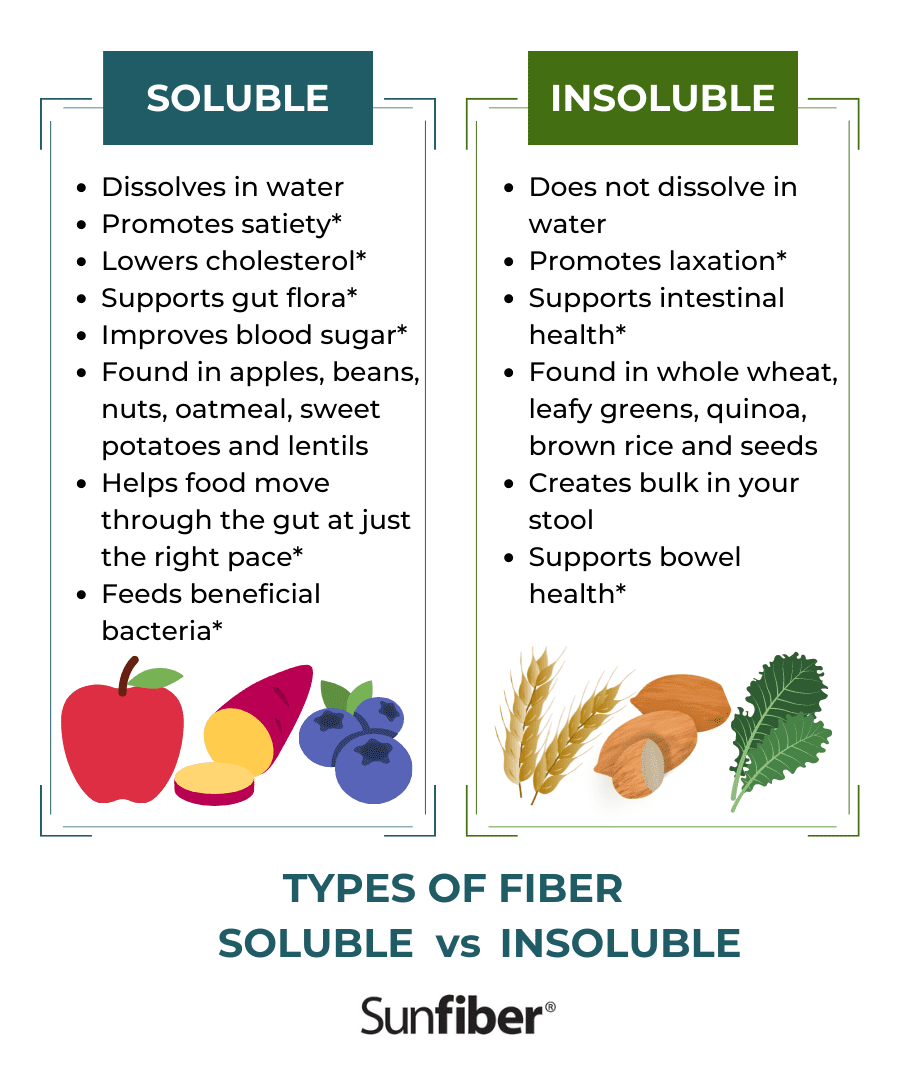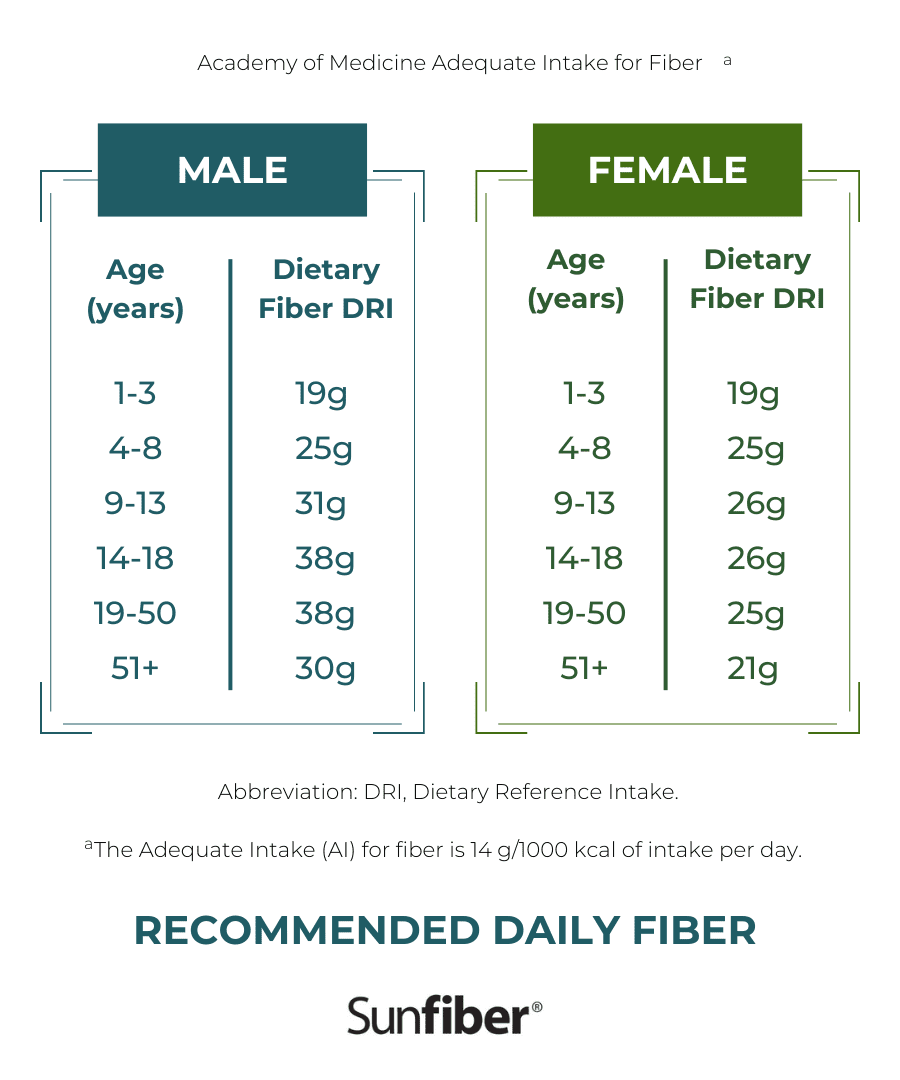Soluble Fiber: Everything You Need to Know

✓ Expert Review by:
Derek Timm, PhD, RDN
Soluble fiber plays a significant role in good health, yet many people struggle to get enough in their diet.
We’ve assembled helpful resources about soluble fiber, including its benefits, sources, daily intake requirement and more.

Jump to Section
What are soluble and insoluble fibers?
Soluble and insoluble fibers both come from plant sources, and both are important for your digestive wellness. But they serve different functions.
Soluble fiber is a dietary (plant) fiber that dissolves in water. The right soluble fiber supports good digestion, feeds beneficial bacteria, attenuates glucose absorption, lowers cholesterol and reduces hunger (increases satiety). Just be careful. Consuming some soluble fibers may lead to additional gas, bloating and worse: loose stools.
Insoluble fiber, what your great grandmother may have called roughage, does not dissolve in water. As with soluble fiber, it also comes from plants. Insoluble fiber creates the bulk in your stool. It carries toxins with it as it moves stool through the digestive system.

Which is better, soluble fiber or insoluble fiber?
Both soluble fiber and insoluble fiber are valuable to your health, each offering unique benefits. Try to get a combination of both in your daily diet.
How Fiber Works
Insoluble and soluble fiber play different roles, which is why consuming both is important.
Insoluble fiber gives stool bulk, often leading to an easier-to-pass stool. It works by absorbing fluids and sticking to other digestive byproducts as it passes through the digestive tract.
Soluble fiber either dissolves in water or forms a gel-like substance. Some are prebiotics and are digested by healthy gut bacteria in the large intestine, nourishing and supporting the gut microbiome. In addition to supporting healthy digestion, soluble fiber helps support blood glucose and cholesterol levels.
Soluble Fiber Benefits
Some soluble fiber benefits are well known. Researchers are also discovering exciting new benefits of fiber, especially as they explore the relationship between soluble fiber and overall wellness. Some known soluble fiber benefits include:
-
Supporting regular bowel movements*
-
Helping support healthy blood cholesterol levels*
-
Helping manage blood sugar levels*
-
Assisting with weight management*
-
Supporting the gut/brain axis*
Regular bowel movements
The most well-known soluble fiber benefit is its ability to help normalize bowel movements. By softening stool, soluble fiber helps make it easier to pass. Soluble fiber also absorbs water, which may help those dealing with watery stools.
Lower cholesterol
Soluble fiber has been found to help support healthy blood cholesterol levels, with most research focusing on its impact on low-density lipoproteins (often referred to as “bad” cholesterol).
Helping manage blood sugar levels
Studies have found soluble fiber helps attenuate the blood glucose spike after meals. It may also help maintain blood pressure within a normal range, and promotes overall heart health.
Weight management
Dietary fiber helps with weight management. Fiber tends to take longer to digest so you may feel full for longer and reduce hunger. Plus, high-fiber foods tend to have fewer calories by volume.
Gut-brain axis
Researchers are beginning to understand that not all of our moods and feelings start in the brain. Some of them start with the gut bacteria (gut microbiome). This is sometimes referred to as the gut/brain axis. Adequate prebiotic soluble fiber intake helps to keep beneficial gut bacteria in balance.
Recommended Amount of Daily Fiber
America has a fiber gap. The National Academy of Medicine (formerly the Institute of Medicine) states that only about 5% of adults consume the recommended amount of dietary fiber. In other words, it’s a safe assumption that you aren’t meeting your daily fiber requirements.
Daily fiber recommendations vary primarily based on age and gender. Typical bowel habits and health conditions may also influence your fiber needs.
Remember that you should incorporate sources of soluble fiber and insoluble fiber into your diet.
Daily Fiber Guidelines for Males:
Age 1-3: 19 g/day
Age 4-8: 25 g/day
Age 9-13: 31 g/day
Age 14-50: 38 g/day
Over age 50: 30 grams
Daily Fiber Guidelines for Females:
Age 1-3: 19 g/day
Age 4-8: 25 g/day
Age 9-13: 26 g/day
Age 14-18: 26 g/day
Age 19-50: 25 g/day
Over age 50: 21 grams

Best Ways to Get Your Daily Soluble Fiber
In general, the best natural sources for fiber come from whole-grain foods, fruits, vegetables, beans and nuts.
Note that the more processed the food, the lower its fiber content may be. Refined foods such as white bread and non whole-grain cereals undergo a refinement which removes the bran from the grain, removing a source of fiber.
Some of the most recommended snacks and meals for increasing fiber content are:
- Black beans
- Chickpeas
- Whole grains
- Edamame
- Berries
- Brussels sprouts
- Almonds
- Popcorn
- Granola bars
- Carrots
- Kale chips
For optimal soluble fiber intake, make each meal count. Choose a whole grain or bran breakfast cereal, use whole-grain flour for baked goods, and incorporate more beans and produce into your meals or snacks.
If you’re making a significant dietary change, be sure to drink plenty of water to help your body adjust to fiber increases. Both soluble fiber and insoluble fiber require water to function correctly.
Which food is the best source of soluble fiber?
Many dietitians consider black beans to be the most efficient source of soluble fiber, containing roughly 5 grams of soluble fiber when cooked.
About Soluble Fiber Supplements
If you’re struggling to increase your fiber intake, some fiber supplements can be reliable alternatives.
Keep in mind that not all fiber supplements are the same. Not all have been evaluated in clinical trials to learn if they provide the same benefits as fiber from your diet.
If you’re interested in a soluble fiber supplement, choose one that is all natural and has been extensively researched. This should help you get the best possible results, according to expert dieticians.
Look for supplements containing Sunfiber. It delivers clinically substantiated health benefits, is non-GMO, low-FODMAP certified, gluten free and meets the FDA’s definition of a dietary fiber.
Sunfiber vs Other Soluble Fibers
Sunfiber promotes a healthy digestive balance without the excess gas or bloating associated with other fibers.*
Sunfiber is the world’s most-researched soluble fiber. Unlike many other supplements, Sunfiber is derived from the guar plant. The fiber-packed bean is transformed into an easy-to-consume powder without the side effects or unpopular taste/consistency of other soluble fiber supplements.
Benefits of Sunfiber

Low FODMAP** and Gluten Free

Tasteless, Odorless and Clear-mixing

Supports weight management*

Reduces the Glycemic Index*

Meets the FDA definition of dietary fiber
About Sunfiber
Sunfiber is a truly regulating soluble fiber that helps to normalize the digestive system. It is clinically shown to be effective at helping occasional diarrhea and occasional constipation. Sunfiber is an excellent prebiotic for supporting digestive health and microflora balance. It is tasteless, colorless, odorless, gluten free, and 100% water-soluble.
Sunfiber starts with natural guar beans which are grown in fields that are not treated with chemicals. No preservatives are used or added during manufacturing. It is certified Kosher, Halal, vegetarian (not of any animal origin nor derivative), Non-GMO Project Verified and certified glyphosate residue free.
All raw materials are kept free from GMO and their derivatives throughout the production process. Sunfiber qualifies as an organic material and is 100% gluten free. It is certified Informed Ingredient, indicating that it is routinely tested for a wide range of prohibited performance-enhancing substances, and therefore safe to be used by athletes without concerns of adulteration or contamination.
Our Recommended Soluble Fiber Supplements
Learn More About Soluble Fiber
Our blog answers additional information about the benefits of fiber and how to get your recommended daily intake.
Soluble Fiber Overview: Key Takeaways
Soluble fiber has been found to benefit gut and overall health in quite a few ways, including supporting healthy cholesterol levels and regulating bowel movements.
Most Americans don’t get enough dietary fiber, and daily recommendations vary primarily by age and gender.
Beans, oatmeal, sweet potatoes and lentils are some of the best sources of soluble fiber, supplements such as Sunfiber can also be a reliable option for increasing soluble fiber intake.
All these helpful facts about soluble fiber have been written by fiber expert Derek Timm, PhD, RDN. Let us know if you have any further questions and we’ll be happy to help.




